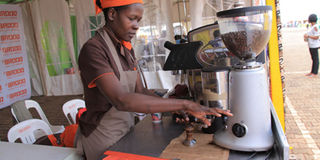Low value addition hurts Comesa goods

A coffee brewer processes coffee beans in Kampala. If Uganda and other Comesa member states do not add value to their agricultural products, they will be left out of mega trade agreements. PHOTO BY RACHEL MABALA
What you need to know:
About 70 per cent of the reported Non-Tariff Barriers in Comesa region are constituted by Technical Barriers to Trade and Sanitary meaures, Dorothy Nakaweesi writes.
Most of the products traded amongst the Common Market for Eastern and Southern Africa (Comesa) countries are ranked low at 11 per cent of the total region’s exports because of their limited value addition.
Experts attribute this to lack of industrial diversification, the existence of Non-Tariff Barriers such as health standard requirements, supply side constraints and cumbersome border measures.
Mr Thierry Kalonji, Comesa’s director of agriculture and industry says: “Almost 70 per cent of the reported NTBs in the region are constituted by Technical Barriers to Trade (TBTs) and Sanitary and Phytosanitary (SPS) measures.”
He says if these constraints are not addressed, Comesa countries will find it difficult to take advantage of the mega trade agreements such as the Tripartite and the Continental Free Trade Area.
To this effect, a new capacity building project dubbed: ‘Mainstreaming SPS capacity building into the Comprehensive Africa Agriculture Development Programme (CAADP) has been launched.
Budget
The project has a budget of $464,075 (Shs1.7b) out of which $390,075 (Shs1.4b) is provided by the Standards and Trade Development Facility (STDF).
STDF is a global coordination and knowledge hub of the World Trade Organisation (WTO) that brings together leading trade, health and agriculture experts worldwide to address persistent and emerging SPS challenges and drive forward solutions.
The project covers five countries that are members of the Common Market for Eastern and Southern Africa (Comesa); Kenya, Uganda, Rwanda, Ethiopia and Malawi.
It is being implemented under the ‘Prioritising SPS Investments for Market Access (P-IMA) framework, an initiative of the STDF.
Kenya and Uganda, are the first countries that have started implementing the project.
Varied standards
Kenya’s Principal Secretary in the Ministry of Trade, Dr Chris Kiptoo, says the variation of SPS capacity across Comesa countries and the continent undermine the region’s capacity to trade with itself.
“The diversity of strengths and weaknesses on the continent demands greater collaboration between countries that belong to the same Free Trade Area (FTA), particularly the ACFTA that just came into force,”Mr Kiptoo said.
He observed that compliance with Sanitary and Phytosanitary (SPS) measures opens tremendous export opportunities for producers and exporters, both at the intra-regional trade level and international level.
Experts cited the following as some of the SPS challenges that countries faced, which the new project seeks to address; varied TBT standards and regulatory frameworks across member states, absence of good regulatory practice and low levels of compliance in the public and private sectors.




